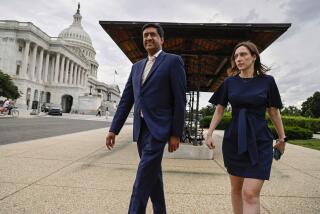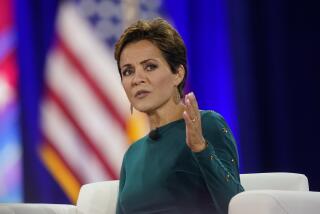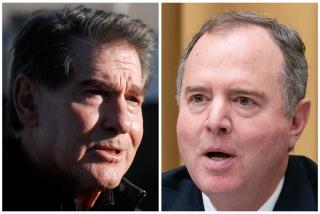Harkin Betting the Time Is Right for Return to Past : Politics: Iowa senator’s message plays on traditional populist themes. Some observers see a generational gap.
WASHINGTON — Iowa Sen. Tom Harkin grew ashen, just for an instant, as the jetliner carrying him from New Hampshire to Washington touched down at Dulles International Airport. He had just heard some bad news from a flight attendant who was in phone contact with his campaign headquarters.
“Well,” Harkin said, his mouth tightening, “Cuomo’s in the race.”
It took several tense follow-up calls before Harkin relaxed. The flight attendant had it wrong. That day, New York Gov. Mario M. Cuomo removed himself from the 1992 presidential contest, a decision widely seen as benefiting Harkin the most among the six major Democratic candidates.
For months, Cuomo’s shadow loomed over Harkin’s White House hopes, inhibiting political donors and clouding the Iowa senator’s efforts to position himself as the only candidate representing the party’s heritage and appealing to its liberal wing. Now, with Cuomo out of the race, Harkin, 52, stands alone in conducting what he calls “my little experiment,” an aggressive, populist throwback to Harry S. Truman’s “give ‘em hell” campaigns.
With the Feb. 18 New Hampshire primary just ahead, Harkin’s candidacy is still perceived as a gamble for his snake-bit party--based on the premise that hard times are ripe for an old-fashioned Democrat unafraid to pitch the party’s traditional economic cures and go after the GOP jugular. Harkin, who has won two Senate contests with similar themes, likes it that way.
“People power,” he says repeatedly, “will beat money power any day of the week as long as you’re organized as a tight fist.”
Harkin hit an early stride with his fiery stump speeches, and his campaign has, for the most part, avoided day-to-day stumbles. And, significantly, he leads his rivals in campaign donations, recently qualifying for $1,075,189 in federal matching funds--a feat that has left some opponents grousing about his reliance on money from political action committees. Harkin responds that Democrats need to plumb all available sources to hold their own against the Republican Party, which he calls “the mother of all money machines.”
“He’s been steady, his message is clear and his fund raising is on track,” said Nathan Landow, a Harkin supporter and Maryland state Democratic chairman.
But Harkin’s “little experiment” has not produced much visible success in the polls. He has placed in the middle or at the bottom of the field in most regional and national surveys. His barbed rhetoric may strike a chord among union leaders and party regulars yearning for a pit bull to unleash against George Bush, but he is still a tough sell to Democrats who believe a centrist approach is the best route to the White House.
“It works great with the party faithful and activists,” said one Democratic pollster. “But the message may be a little hot for the average Democratic voter.”
Harkin concedes no weaknesses. Lean and craggy-faced, the two-term senator ends each speech with stirring flourishes--as he did recently in Orlando, during a daylong marathon of appearances before Florida party activists.
“I believe that if you’re strong for what you believe in, and you can take to the people that sense of strength and the courage of your convictions, and if it’s based on the values that most Americans have . . . they’ll come to us like a strong magnet, and we’ll pull ‘em in,” he said, each time prompting bursts of applause.
Quoting the Bible and just-folks aphorisms, gibing at moderate Democrats as “warmed-over Republicans,” mocking the President as “George Herbert Hoover Bush,” Harkin tells his audiences that a populist candidate is best equipped to bring out Democrats next fall and bring home disaffected blue-collar voters who joined GOP ranks during the Reagan-Bush era.
Conservative political analyst Kevin Phillips, who argues that a populist approach to economic issues offers the most effective ammunition for Democrats, says the Iowa senator “represents something the Democrats need to get back to, a Harry Truman-like feistiness on behalf of the little guy in politics.”
But Harkin, who heeded Phillips’ thesis to frame his campaign message, must overcome some built-in weaknesses. “Because he’s a pretty good representative of where he comes from--Midwest farm country--it’ll be difficult to package himself for other parts of the country and other parts of the party,” Phillips said.
There are generational as well as regional barriers. As he repeatedly invokes the names of past party greats--from Franklin D. Roosevelt to Hubert H. Humphrey--Harkin is, in essence, selling political nostalgia.
He seems most at home with middle-aged or older Democrats, who respond with passion to his heated rhetoric. The high point of Harkin’s campaign so far came at the November AFL-CIO convention in Detroit, where his get-tough-on-trade exhortations and repeated references to his blue-collar upbringing--he is the son of a coal miner--won lusty cheers from labor delegates.
Harkin has a harder time connecting with the young, who are less aware of party icons and not necessarily receptive to his pitches for a return to big government.
When an earnest New Hampshire high school senior gave him a long introduction recently before a speech to students in Manchester, Harkin thanked her, then joked: “It sounded for a minute like an episode from ‘This is Your Life.’ ” His reference to a television show that had gone off the air before the teen-agers were born was lost on his young audience. The few scattered laughs were all from adults.
The ambitious programs Harkin outlines also draw on earlier eras. His call for a sweeping jobs program echoes Roosevelt’s New Deal and his best-and-brightest service initiatives recall John F. Kennedy’s New Frontier and Lyndon B. Johnson’s Great Society.
Harkin talks of pulling the plug on military spending for Europe and Asia, and using the money saved to fund the rebuilding of the nation’s decayed infrastructure--and create thousands of jobs. He favors a G.I. Bill-style education program that would pay the way for students’ college education in return for service in the military or national volunteer organizations.
“What we need is a new Democratic economic program for America, to take the wealth of this country and invest it here and put people to work,” Harkin says repeatedly.
But beyond his stump speech, Harkin often resorts to vague, sound-bite answers. His backers say his reluctance to get specific is deliberate. “He doesn’t want to come off sounding like a policy nerd,” said one supporter.
There have been times when that seeming aversion to detail has backfired. During the nationally televised debate among the Democratic candidates earlier this month, Harkin squabbled with moderator Tom Brokaw over the senator’s contention that the savings from canceling one B-2 bomber could pay for $850 million in public programs. Brokaw said that NBC calculations found that the programs would actually cost $1.8 billion. Harkin complained that NBC used a different base to arrive at its figures, but the Wall Street Journal later did its own computations and came up with a $1.1-billion price tag.
Harkin’s campaign staff believes such minor controversies will have faded by the Iowa Democratic caucus on Feb. 10 and the New Hampshire primary eight days later.
Harkin has been forced to spend more time in Iowa than the other candidates because of his favorite-son status. Not only is he expected to win there, but a strong second-place finish by one of his rivals could be construed as a Harkin setback.
It is in New Hampshire where Harkin faces his most grueling work. Early polls have shown former Massachusetts Sen. Paul E. Tsongas at the head of the pack. But a survey released last week showed Arkansas Gov. Bill Clinton gaining ground, while Harkin was mired back in the pack.
Some Harkin supporters have complained that he has been slow in developing a television advertising strategy for New Hampshire. On Monday, his campaign took a key step toward accelerating that process, announcing the hiring of Swope & Associates, a Boston-based media firm that devised Michael S. Dukakis’ successful advertising for the primaries in the 1988 campaign.
Harkin’s campaign staff declined to detail their media strategy, but campaign manager Tim Raftis said it will mirror “what you hear in his speeches, a real focus on bread-and-butter issues that impact on working people.” Raftis said the ads will also attempt to draw contrasts between Harkin’s vision and what he called the “message of privilege” emanating from the White House.
Longtime Harkin campaign strategist John Fitzpatrick said that after the New Hampshire primary, Harkin can be expected to push hard in some of the early Midwestern and Eastern primary states, such as South Dakota, Minnesota and Maryland. Harkin also expects to be helped, Fitzpatrick said, by the smaller number of Southern states--five this year as opposed to eight in 1988--voting as part of the Super Tuesday primaries on March 10.
“Will he get more votes than anyone (on Super Tuesday)? Probably not,” Fitzpatrick said. “But can he do well in Florida and Texas and win enough elsewhere to keep his momentum? We’ve got hope.”
More to Read
Get the L.A. Times Politics newsletter
Deeply reported insights into legislation, politics and policy from Sacramento, Washington and beyond. In your inbox three times per week.
You may occasionally receive promotional content from the Los Angeles Times.










